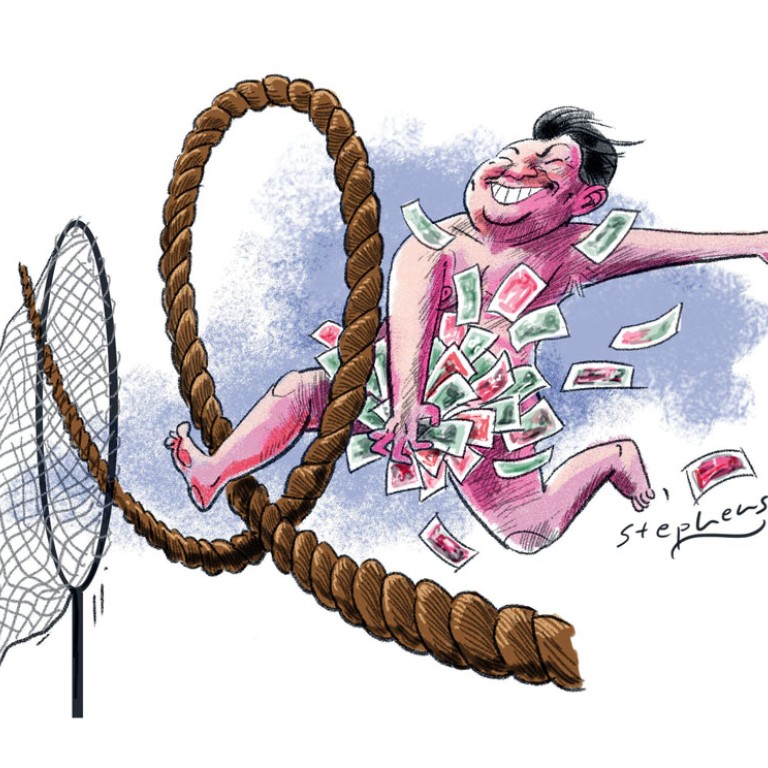
China's corrupt officials must be denied an overseas haven
Gary Sands says more cooperation is needed between the US authorities and China to facilitate the return of corrupt Chinese officials who fled to America with their ill-gotten gains
In an ongoing crackdown on corruption, the Ministry of Public Security recently announced a policy to encourage reporting on "dual citizens" - people who obtain citizenship in another country yet still maintain their Chinese citizenship and benefits.
The "fox hunt" campaign, announced in July, seeks to catch corrupt officials who have fled overseas with their illicit assets.
As part of the crackdown, the ministry is using a tactic once employed during the Cultural Revolution - asking the populace to help identify and blow the whistle on suspected fellow citizens. By seeking the assistance of a population fed up with corrupt officials, the authorities hope to uncover so-called "naked officials", public servants who have sent their family and assets overseas in an effort to hide their ill-gotten gains.
Given the size of China's population and the opportunities for corruption, the task is daunting. A 2008 report by the People's Bank of China suggested that anywhere from 16,000 to 18,000 individuals accused of corruption had fled China since the mid-1990s. The Washington-based Global Financial Integrity group estimates that, between 2005 and 2011, some US$2.83 trillion flowed illegally out of China.
The authorities brought back more than 300 fugitives in the first half of 2014, according to Xinhua. Interpol is also in the hunt, having issued arrest warrants for 69 Chinese wanted on charges of corruption, embezzlement, fraud and bribery.
So where are Chinese authorities and Interpol looking for these "naked officials"? Analysts note that Asia and Africa are popular destinations for economic fugitives, but countries that do not have extradition treaties with China are also very popular. China has 38 extradition treaties, but not with the US, Canada and most European countries.
Liao Jinrong, an official with the Ministry of Public Security, believes "the US has become the top destination for Chinese fugitives fleeing the law", with more than 150 of these "naked officials" remaining at large there. Over the past decade, only two of these fugitives have been brought back to China from the US.
The lack of extradition treaties with the US and European countries, along with cumbersome legal procedures, are mostly to blame for the low extradition rate. The US and European countries are loath to hand suspects back to China - where they suspect the courts will systematically violate their human rights or condemn suspects to death. For its part, Beijing is dismayed at the lack of cooperation in what it feels is its right to prosecute its own citizens under its own laws.
Yet perhaps most galling to Beijing is not the near-impossible extradition of its economic fugitives, but the welcoming arms of America. A recent article in revealed that investors from China accounted for 85 per cent of US investor visas this fiscal year. Last year, they accounted for more than 80 per cent of the immigrant investors. The immigrant investor scheme, also know as the EB-5 programme, was established in 1990 to extend visas to foreign investors whose contributed capital could help stimulate the US economy through job creation and investment.
The programme initially sought to attract a diversity of new citizens - no single country is allotted more than 7 per cent of the total visas available under programme rules. But there are exceptions made in the event of lax demand - the unused visas from other countries' quotas can be transferred to another where demand is stronger.
Under the EB-5 programme, applicants promise to make a capital investment of either US$500,000 or US$1 million, depending on whether the investment is in a high-unemployment/rural area, or an area with average employment. After a two-year waiting period, during which the applicant pledges to create or preserve at least 10 jobs within two years, the applicant (along with family members) typically become eligible for green cards, or permanent residency.
The investor visa programme stipulates that the assets contributed cannot have been "acquired, directly or indirectly, by unlawful means (such as criminal activities)" and "investment capital cannot be borrowed", although how the authorities can make a clear judgment on both these criteria is subject to debate.
Last December, the Department of Homeland Security suggested that the immigration service did not have the necessary legal power or wherewithal to properly police the programme, stating that it "is limited in its ability to prevent fraud". Indeed, much criminal activity in China goes undetected, as do opaque schemes between individuals who may transfer assets among themselves using hidden side agreements, or sell shares in the new enterprise they are expected to create in the US.
What is clearly needed is more cooperation among Chinese officials and US judicial authorities to help pursue those economic fugitives who have attained their wealth through illicit means. Officials from the public security ministry are reportedly pursuing a meeting with top US judicial authorities, including the Department of Homeland Security, in order to discuss extradition procedures, the apprehension of economic fugitives, and the recovery of stolen assets.
Beijing should further seek the cooperation of the US and European countries through the UN Convention Against Corruption, which obliges the 140 countries and regions that have ratified it to cooperate in the fight against graft.
There is nothing wrong with legitimate investors from South Korea, India, Mexico, China or any foreign country taking their honest, hard-earned capital to the US and using it to help stimulate the economy and create jobs. The problem lies in determining the source of an applicant's wealth when dealing with officials of foreign countries where transparency is often lacking.
The next round of US investor visas becomes available on October 1 - let's hope there is greater international cooperation among national authorities so that the American visas go to those who truly deserve them.

